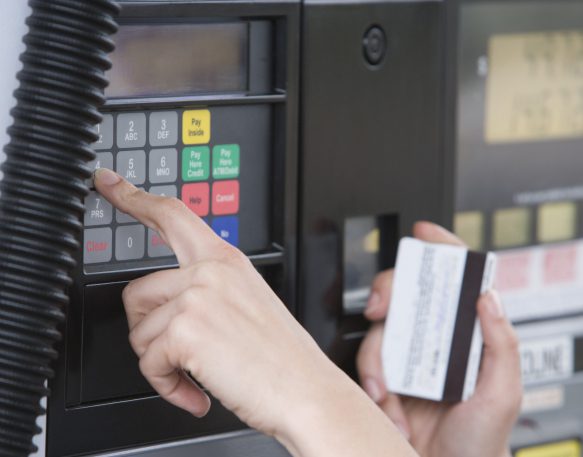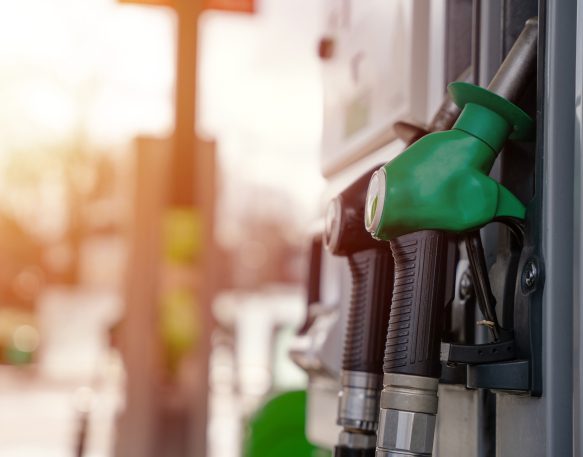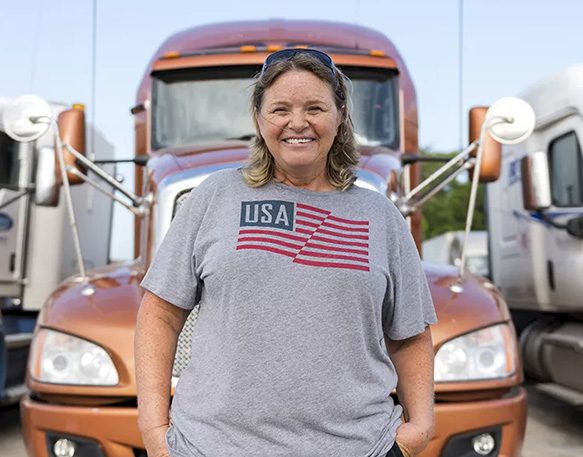Fuel cards for truckers have become an indispensable tool in modern fleet management. After all, they can help carriers streamline and control fuel-related expenses. Not only will you be able to save some money at the pump, but you’ll also be able to set specific spending limits and purchase restrictions on each card. As a result, you can ensure that your drivers only use their fuel cards with rewards for authorized fuel purchases, promote responsible fuel consumption, and ultimately reduce your operational costs.
So, what is a fleet fuel card? They function much like credit or debit cards. However, they are specifically designed for fuel-related expenses. When a driver uses a fuel card to make a purchase at a fuel station, the transaction is recorded and linked to the respective vehicle and driver. These transactions are then compiled into detailed statements, which fleet managers can access online or through specialized software.
In this guide, we’ll go over answers to all the common questions about fuel cards for owner-operators, fuel cards for small businesses, and fuel cards for fleets. Whether you’re wondering what is a fleet card or need to know where to buy a fuel card, how you use a fuel card, how fuel cards work, or what is the best fuel card for truckers — we’ve got you covered!
Benefits of fuel cards
Fuel cards with discounts offer several benefits that can significantly improve fleet management and help businesses like yours save money.
The most obvious benefit of fuel cards for truckers is that they provide fuel discounts, which can lead to significant savings — and since fuel is a carrier’s largest and most variable expense, fuel cards with rewards and discounts can be a game changer. Even though fuel prices are unpredictable, a fleet card can provide consistent savings, helping your business be as profitable as possible.
Fuel cards with discounts can also help improve your cash flow. Instead of needing the money on hand each time you need to refuel, you and your drivers can use your fuel card and pay once you receive your consolidated monthly bill. This will allow you to maintain cash liquidity in the meantime to cover your other operational needs.
Additionally, fuel cards for small businesses and fuel cards for fleets can streamline expense tracking and management. Every fuel card transaction is automatically recorded and linked to a specific vehicle and driver, providing detailed insights into fuel consumption patterns, which you can access through online portals and reporting tools. As a result, you and your team won’t have to spend as much time on administrative tasks. After all, you won’t have to manually track purchases or worry about reimbursing drivers. At the same time, monitoring and analyzing fuel expenses will be easier than ever, which can result in better budgeting and financial planning.
The best fuel cards for small businesses, owner-operators, large fleets, and everyone in between also offer enhanced control and reporting. Fleet managers can easily set spending limits and restrictions for each card, which can help reduce theft, prevent unauthorized purchases, and ensure drivers comply with company policies. Plus, fleet managers can access real-time fuel reporting with certain fleet card companies, enabling them to quickly identify discrepancies. Fuel cards can even help simplify International Fuel Tax Association (IFTA) reporting.
Additionally, fuel cards for truckers can provide valuable data and insights into your fleet’s fuel consumption patterns. You can access detailed reports that show where, when, and how fuel is being used, enabling you to identify inefficiencies and opportunities for improvement.
Fuel cards can also provide additional safety. After all, if a driver has a fleet card, they won’t need to carry cash or a credit card with them, which can reduce the risk of theft and loss. Plus, since you can customize fuel card spending limits and view transactions and other activity in real-time, you can reduce the risk of unauthorized and fraudulent transactions.
Types of fuel cards
Before making a choice, you’ll want to understand the different types of fuel cards. Types of fuel cards for truckers you need to know about include:
- Branded fuel cards: Branded fuel cars are issued by specific fuel companies, such as Shell, ExxonMobil, BP, or Chevron, and are ideal for carriers that are loyal to a specific chain of fueling stations or operate in regions that contain many of the brand’s locations. Branded fuel cards also often provide rewards programs but shouldn’t be confused with gas station loyalty cards.
- Universal fuel cards: While branded fuel cards are only accepted at specific fueling stations, universal fuel cards, also known as third-party patrol cards, are more widely accepted and can be used at a broad network of fuel stations, regardless of brand. These cards provide more flexibility because the service providers have contracts with several refueling stations. This creates larger acceptance networks, which can be very convenient for carriers with fleets that operate in multiple regions or drivers that travel extensively. Some fuel cards for owner-operators and fleets truly live up to the name “universal” and are accepted at over 95% of locations across the country. As a result, you can refuel nearly anywhere. It can also save you time and money, as you won’t need to spend time searching for a location that accepts your fuel card. Plus, since you aren’t tied down to a single fuel brand, you can purchase your fuel from the locations offering the lowest prices at the moment, leading to greater savings.
- Fleet fuel cards: Fleet-specific fuel cards are designed with features tailored to the needs of fleet managers. Not only do they offer detailed reporting and expense tracking tools, allowing businesses to monitor and manage their fuel expenses efficiently, but they also often provide controls like purchase restrictions and spending limits for added security. Fleet fuel cards also usually offer online access and reporting, flexible payment options, real-time notifications, and the ability to purchase maintenance services. Some even provide volume-based or wholesale-based pricing discounts and rebates.
- Credit card fuel cards: Some credit card companies offer fuel-specific credit cards. These cards provide the convenience of a regular credit card while offering cashback or rewards for fuel purchases. While they aren’t fleet-focused, they can be beneficial for businesses that want to earn rewards on fuel expenses and offer purchase controls.
- Prepaid fuel cards: Prepaid fuel cards for truckers involve paying in advance, making them ideal for maintaining a close eye on budgets, small fleets, or temporary staff members. Once you’ve loaded your chosen amount onto a fleet card, you can give it to a driver, and it will work in the same way that prepaid gift cards do. They’ll be able to use the prepaid fuel card at the pump until the balance is depleted.
Choosing the right fuel card
Choosing a fuel card isn’t easy, but we’re here to help. You’ll want to assess your fleet’s specific needs and goals, research multiple fleet card companies, compare rewards and fees, and read reviews from other carriers and owner-operators when deciding where to buy a fuel card.
Other considerations to keep in mind are:
- Your fleet: How big is your fleet? Where will it operate? What are some fuel consumption patterns you’ve noticed? The answers to these questions can serve as a guide when determining which fuel card is best suited for your business’s needs and could point you toward the best fuel cards for small businesses or the best fuel cards for large fleets.
- Financial aspects: You’ll also want to take the financial aspects into account. For example, think about the fleet card price structure, account maintenance fees, transaction fees, and custom reporting fees. These costs can quickly add up!
- Administrative features: It’s also worth exploring each fuel card’s administrative features. Does it offer expense tracking and online reporting? Does it collect data, such as price per gallon, driver ID, location, and odometer readings for every transaction? Can you customize spending limits and purchase restrictions?
- Controls and security: When it comes to fuel card controls and security, some fuel cards go above and beyond. They can give you control over whether drivers can make in-store purchases in addition to at-pump purchases or limit purchases to specific locations, amounts, and times. Some fuel cards with rewards have individual pins and record detailed transaction data, and even give you the opportunity to override purchasing limits in real-time if an emergency occurs.
- Acceptance network: A fuel card is no good if it isn’t accepted at the stations your fleet regularly uses. So, make sure to research fleet card companies’ partners and included fuel stations.
- Mobile access: Chances are you and your drivers are on the move — and that means mobile access can be a big help. With the right app, you can quickly find fuel stations and more.
- Integration with existing systems: It’s also worth thinking about whether a fuel card is compatible with your existing fleet management software, as having a fuel card capable of integrating with systems you already use can make a world of difference.
- Customer support: Many overlook the importance of quality customer support, but the truth is that it can make or break a fuel card. You’ll want to think about if there’s a driver support line or an assigned representative. Research whether your chosen fleet card offers after-hour support and short hold times, as you’ll want help fast to keep your drivers on the road.
How to apply for a fuel card
Once you’ve settled on a fuel card that can meet your business’s needs, it’s time to think about how to apply for a fuel card. While every fuel card provider has a slightly different process, there are a few steps that will be applicable for nearly all fleet card companies you find. For example, you’ll likely want to:
- Gather basic business information: Start by gathering some information about your business. You’ll want to have your business’s legal name, address, tax identification number, and contact details.
- Collect your business’s financial information: In addition to the basics, some fleet card companies want financial insights into your business. You may need to provide information on your revenue, bank account, and credit history.
- Send in your application: In the past, applying for a fuel card meant mailing in all your documents or having a lengthy phone call to provide all the necessary information to the fuel card provider. However, these days, many fleet fuel cards with discounts have online applications available, which can simplify the entire process. All you have to do is fill out the form and click submit!
- Wait for verification and approval: After submitting your application, you’ll need to wait for your fuel card provider to review your information. They may also perform any necessary credit checks before telling you whether your application was accepted or not.
- Receive and activate your cards: If your application is accepted, you’ll receive your fuel cards in the mail. Keep in mind that you may need to follow some simple activation instructions before you and your drivers can start using them at the pump.
How do you use a fuel card?
After successfully applying for and receiving your fuel cards, it’s time to put them to good use — and if you’re confused about how do you use a fuel card, don’t worry! You or your drivers can use a fuel card at the pump in the same way you might use a credit card. Just insert the card into the card reader and follow the prompts on the screen. In some cases, a PIN or driver ID may be required. After completing the transaction, the fleet card will cover the cost of the fuel, and the transaction will be recorded for tracking and reporting purposes.
In addition to knowing the basics of how do fuel cards work, you’ll want to understand how to maximize your rewards and discounts. First, you should train your drivers. Make sure they understand how to use the cards responsibly, know the company policies and restrictions, and are educated on the most fuel-efficient driving techniques. Also, make sure you’re up-to-date with your fuel card program so you can take advantage of all the latest discounts and rewards — and don’t forget to let your drivers know of any new changes.
As always, you’ll want to regularly monitor fuel prices and plan routes to ensure your drivers can conveniently access fuel stations with discounts, as optimizing fuel locations can save them time, fuel, and money. If you want to compound your savings, you can also try leveraging volume discounts and stacking your fuel card rewards with other discounts, such as loyalty programs offered by fuel stations.
When it comes to fuel card management, you’ll want to follow a few best practices, including:
- Reviewing reports and analytics: Having a fuel card that offers detailed reporting is no good if you don’t actually take the time to regularly review those reports. Make sure to dive into your fleet card transaction reports and analytics to search for trends, identify anomalies, and discover areas where you can improve.
- Setting spending limits and restrictions: It’s also worth customizing your fleet card settings. Consider establishing spending limits, fuel type restrictions, and other controls, as this can prevent unauthorized or excessive spending.
- Reviewing schedules and routes: It can be tempting to stick to the status quo if you have a regular schedule and frequent routes, but that’s a mistake! It’s always a good idea to review your operations and look for optimization opportunities. For example, you might reroute drivers so they pass by fuel stations that provide the best discounts.
- Creating a fuel card policy for drivers: To make sure everyone is on the same page, consider drafting a document that explains how, where, and when drivers should use a fuel card. Not only will this be informative, but it can also send the message that drivers need to take their fuel cards seriously.
- Deactivating cards that aren’t in use: If a driver leaves, don’t forget to cancel their fuel card.
Save with the DAT One Fuel Card
If you’re ready to start saving on fuel costs and boost your cash flow, look no further than the DAT One Fuel Card. The DAT One Fuel Card is designed to help carriers and owner-operators manage fuel expenses more effectively and keep more money in their pockets.
Whether you’re searching for the best fuel card for small businesses, large fleets, or truckers overall, the DAT One Fuel Card can meet your needs. Enjoy flexible refueling options and discounts designed to help you control costs and maximize your profitability.
Take control of your fuel spending.
Fuel costs can significantly impact your bottom line. The DAT One Fuel Card is here to ease that burden by providing access to valuable discounts and helping you better manage your fuel expenses.
Don’t let fluctuating fuel prices dictate your profitability – learn more about how the DAT One Fuel Card can help you.




